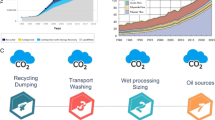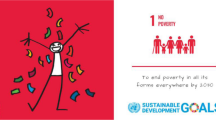Abstract
In the developmentalist era,industrialization has simultaneously transformedagriculture and degraded its natural and culturalbase. Food production and consumption embodies thecontradictory aspects of this transformation. Thispaper argues that the crisis of development hasgenerated two basic responses: (1) the attempt toredefine development as a global project, includingharnessing biotechnology to resolve the food securityquestion, and (2) a series of countermovementsattempting to simultaneously reassert the value oflocal, organic foods, and challenge the attempt on thepart of food corporations and national and globalinstitutions to subject the food question to marketsolutions. It is proposed that the power of food liesin its material and symbolic functions of linkingnature, human survival, health, culture and livelihoodas a focus of resistance to corporate takeover of lifeitself.
Similar content being viewed by others
References
Apfel-Marglin, F. (1997). “Counter-development in the Andes.” The Ecologist 27(6): 221-224.
Arrighi, G. (1994). The Long Twentieth Century: Money, Power and the Origins of Our Times. London: Verso.
Barndt, D. (1997). “Bio/cultural diversity and equity in post-NAFTA Mexico (or: Tomasita comes north while Big Mac goes south).” In J. Drydyk and P. Penz (eds.), Global Justice, Global Democracy (pp. 55-59). Winnipeg/Halifax: Fern-wood Publishing.
Bruno, K. (1998). “Monsanto's failing PR strategy.” The Ecolo-gist 28(5): 287-293.
Esteva, G. (1992). “Development.” In W. Sachs (ed.), The Development Dictionary. London: Zed Books.
Gill, S. (1992). “Economic globalization and the internation-alization of authority: Limits and contradictions.” Geoforum23(3): 269-283.
Goldsmith, Z. (1998). “Who are the real terrorists?” The Ecologist 28(5): 312-317.
Greenfield, G. (1999). “The WTO, the world food system, and the politics of harmonised destruction”, www.labournet.org/discuss/global/wto.html.
Heffernan, B. (1999). “Consolidation in the food and agriculture system.” Report to the National Farmers Union.
Henderson, E. (1998). “Rebuilding local food systems from the bottom up.” Monthly Review 50(3): 112-124.
Hildyard, N. (1993). “Foxes in charge of chickens.” In W. Sachs (ed.), Global Ecology. London: Zed Books.
Hoogvelt, A. (1997). Globalization and the Postcolonial World. The New Political Economy of Development. London: Macmillan.
Kimbrell, A. (1998). “Why biotechnology and high-tech agri-culture cannot feed the world.” The Ecologist 28(5): 294-298.
Kingsnorth, P. (1999). “India cheers while Monsanto burns.” The Ecologist 29(1): 9-11.
Kneen, B. (1995). Invisible Giant. Cargill and its Transnational Strategies. London: Pluto Press.
Lang, T. (1999). “Beyond globalization: Tensions within the UK food system and the challenge to food policy.” Agricul-ture and Human Values 16(2): 169-185.
Lappé, F. M. (1971). Diet for a Small Planet.NewYork: Ballantine.
Lappé, F. M., J. Collins, P. Rosset, with L. Esparza (1998). World Hunger. Twelve Myths. New York: Grove Press, 2nd edition.
Lappé, M. and B. Bailey (1998). Against the Grain. Biotech-nology and the Corporate Takeover of Your Food. Monroe, Maine: Common Courage Press.
LeQuesne, C. (1997). “The World Trade Organisation and food security.” Talk to UK FoodGroup, July 15.
Lehman, K. and A. Krebs (1996). “Control of the world's food supply.” In J. Mander and E. Goldsmith (eds.), The Case Against the Global Economy, and for a Turn Toward the Local. San Francisco: Sierra Club Books.
Lilliston, B. and R. Cummins (1998). “Organic vs 'organic': The corruption of a label.” The Ecologist 28(4): 195-200.
McCalla, A. F. (1999). “World agricultural directions: What do they mean for food security?” (Paper presented at Cornell University, sponsored by Cornell International Institute for Food, Agriculture and Development, March 30).
McMichael, P. (2000). Development and Social Change: A Global Perspective, 2nd edn. Thousand Oaks: Pine Forge Press.
McMichael, P. (1998). “Global food politics.” In F. Magdoff, J. B. Foster, and F. H. Buttel (eds.), Monthly Review, special double issue, “Hungry for profit: Agriculture, food and ecology.”
McMichael, P. (1997). “Rethinking globalisation: the agrarian question revisited.” Review of International Political Economy 4(4): 630-662.
McMichael, P. (1995). “The 'new colonialism': Global regu-lation and the restructuring of the inter-state system.” In D.Smith and J. Borocz (eds.), A New World Order? Global Transformations in the Late Twentieth Century (pp. 37-56). Westport: Greenwood Press.
Mendelson, J. (1998). “Roundup: The world's biggest-selling herbicide.” The Ecologist 28(5): 270-275.
Menotti, V. (1996). “World leaders warn of 'backlash to global-ization'.” IFG News, Fall: 1, 7.
Mintz, S. (1986). Sweetness and Power. The Place of Sugar in Modern History. New York: Vintage.
Nellithanam, R. and Jacob, and S. S. Samiti (1998). “Return of the native seeds.” The Ecologist 28(1): 29-33.
Public Citizen (1998). Comments of Public Citizen, Inc. Regarding US Preparations for the World Trade Organi-zation's Ministerial Meeting, Fourth Quarter 1999.Wash-ington, DC: Public Citizen.
Rifkin, J. (1992). Beyond Beef. The Rise and Fall of the Cattle Culture. New York: Penguin.
Rifkin, J. (1998). The Biotech Century. Harnessing the Gene and Remaking the World. New York: Tarcher/Putnam.
Rist, G. (1997). The History of Development. From Western Origins to Global Faith. London/New York: Zed.
Sachs, W. (1992). “One world.” In W. Sachs (ed.), The Devel-opment Dictionary. London: Zed Books..THE POWER OF FOOD 33 Shiva, V. (1991). The Violence of the Green Revolution. London: Zed Books.
Watkins, K. (1996). “Free trade and farm fallacies. From the Uruguay round to the world food summit.” The Ecologist 26(6): 244-255.
Author information
Authors and Affiliations
Rights and permissions
About this article
Cite this article
McMichael, P. The power of food. Agriculture and Human Values 17, 21–33 (2000). https://doi.org/10.1023/A:1007684827140
Issue Date:
DOI: https://doi.org/10.1023/A:1007684827140




